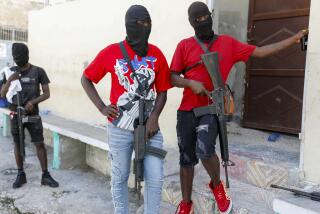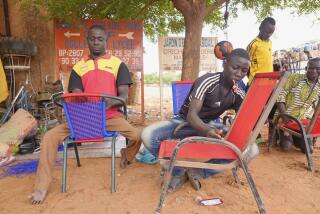Rebels Threaten to Blow Up Trinidad Leader
- Share via
PORT OF SPAIN, Trinidad — Muslim extremists staging a coup attempt in Trinidad and Tobago said Saturday that they wired the country’s prime minister and 11 other government officials to explosives, and they then demanded a plane to fly to Libya, news reports said.
Reporting the first demands by the group since it seized Prime Minister A. N. R. Robinson, other hostages and the Parliament building 24 hours earlier, the Caribbean News Agency said the rebels want safe passage to Libya, a country that the Trinidad government says supports the coup attempt.
The news agency also said Robinson was shot in the leg after refusing to sign a document submitted to him by members of the Jamaat Al Muslimeen, the extremist group that stormed the Parliament building late Friday. At least 22 people have been reported killed in the uprising.
In addition, government-run radio reported a gun battle late Saturday. It said four people were wounded in the clash between two police officers and two civilians outside a television station where the rebels were holding hostages. It gave no details.
The news agency quoted a top police officer as saying that rebel leader Yasin Abu Bakr had demanded an aircraft to fly himself and his supporters to Libya after reaching a cease-fire agreement with Trinidad authorities. The report could not be immediately confirmed. It did not say if the government had accepted the request to provide the plane.
The Jamaat al Muslimeen has enjoyed Libyan support, and Abu Bakr has met and visited Libyan leader Moammar Kadafi.
The breakthrough was announced shortly after two of the country’s most influential religious leaders met with Abu Bakr.
An announcer on government radio said the Anglican bishop of Trinidad and Tobago, Clive Abdullah, and the Roman Catholic archbishop of Port of Spain, Anthony Pantin, met Abu Bakr for talks at the national television headquarters where the rebel leader has repeatedly broadcast appeals for support.
Abu Bakr and his supporters, believed to number up to 500, told Pantin that they had wired Robinson and the other government officials to explosives when they seized them late Friday. They have threatened to blow up the hostages if loyal forces try to free them.
Troops on Saturday surrounded the Parliament building, known as the Red House, where the radical group launched the coup attempt.
Government radio urged both the military and the radicals to cooperate with negotiators and stressed that police units should “follow official orders and refrain from shooting.”
The Caribbean News Agency quoted hospital sources as saying about 22 people, including several police officers, have been killed in gunfights between the two sides since the uprising began.
State-run radio also said there were “lots of wounded” and appealed for doctors and nurses to go to hospitals to cope with the influx of victims.
Witnesses said that parts of the capital were ablaze and that there was sporadic firing going on between forces loyal to the government and supporters of the black Muslim group.
Early in the day, looters were seen dashing down city streets with boxes of shoes, blue jeans and bolts of fabric under their arms.
The international airport has been closed since shortly after the coup attempt began.
Abu Bakr said in a Saturday morning television broadcast that he had overthrown Robinson’s government and that charges were to be brought against him and members of his Cabinet.
He said the government is responsible for a wave of corruption, rape, incest, robbery and drugs sweeping the country.
At least three people were reported killed when the radicals stormed into Parliament while lawmakers were in session Friday and seized 20 officials.
The group was armed with AK-47 rifles. It was holding the captives in the ornate parliamentary chamber and had also taken up barricaded positions on the street outside.
The rebels released eight of the 20 captives before dawn Saturday after mediation by an Anglican priest. Those freed included two government ministers.
The acting president of Trinidad, Joseph Emmanuel Carter, declared in a radio broadcast that the government was still in control. But Carter, who is filling in while President Noor Hassanali is on vacation in Britain, declared a state of emergency and imposed an indefinite curfew.
A spokesman for Deputy Prime Minister Winston Dookeran also said the government was in control of the situation, which he described as “a mass kidnaping.”
“We are victims at this time of extremists, particularly backed by Libya and other international hoodlums,” Dookeran’s spokesman said during a television interview in which he appealed for international help for the southern Caribbean nation.
Caribbean leaders Saturday condemned the coup attempt, and Jamaica and Barbados put their armies on alert in case Trinidad’s government asks for help.
In Washington, the State Department threw its full support behind the elected government of Trinidad and Tobago and condemned the uprising, calling the coup plotters “a violent extremist group” whose attack “has no support from the people, who have enjoyed a long tradition of democratic government.”
“We call upon the parties in this attempted coup to release the hostages under their control and to surrender to the legitimate constitutional authorities of Trinidad and Tobago,” State Department spokesman David Denny said.
Denny added that the United States “is consulting closely” with other governments in the region and has advised American citizens to defer travel to the islands until the situation has returned to normal.
The State Department recommended that the roughly 6,000 American citizens now believed to be in Trinidad and Tobago remain indoors and in contact with the U.S. Embassy there.
State Department officials said they have no evidence that American citizens there are in danger, and they have no current plans to order an evacuation.
Uprising in Trinidad Red House: The Parliament building where Muslim militants say they captured the prime minister and his Cabinet.
BACKGROUND The Caribbean island nation of Trinidad and Tobago is one of 48 members of the Commonwealth, an association of Britain and its former colonies. It covers 1,978 square miles, about 1 1/2 times the size of Rhode Island. The nation has a multiracial population of about 1.3 million, with people of African descent accounting for 40.8%, Indians from Asia 40.7% and mixed races 16.3%. There are also Europeans, Chinese, Lebanese and others. Trinidad and Tobago depends on oil for more than 70% of its export revenue. It has suffered a loss of revenue in recent years because of low oil prices, and unemployment has risen to more than 20%.
More to Read
Sign up for Essential California
The most important California stories and recommendations in your inbox every morning.
You may occasionally receive promotional content from the Los Angeles Times.













